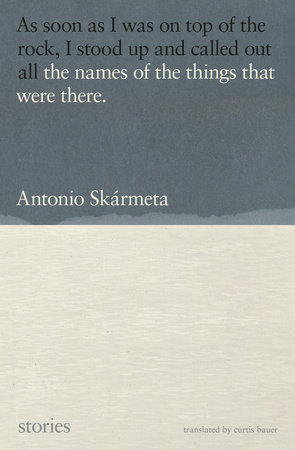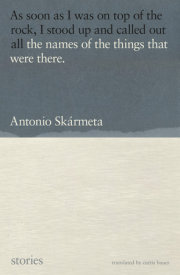Ballad for a Fat Man When Juan Carlos joined our class, we were all happy because we needed a fat guy, our own
gordo.
He showed up in the middle of our English class and our smile was as quick and crass as a rat. We were familiar with the feminoid hysterics of Mr. Smith (Smith and an English teacher!) and we sensed that our laughter couldn’t go beyond our diaphragms without it going unpunished: there it convulsed in our empty stomachs during that first hour of our morning class. If any laughter appeared on our faces it was a frown across the mouth or some insolent sparkle in our eyes.
Juan Carlos was accompanied by a small inspector, so thin he was insignificant, whose suits never covered his ankles or wrists. We decided that Inspector Soto bought his suits in the children’s section of Falabella to save money. It was precisely Soto who pushed Juan Carlos into the room, offering him to Mr. Smith like a cow taken to a butcher. At one point they were each holding one of his arms and the
gordo was smiling at them blankly, turning back and forth like a fan every time they spoke to him.
“Valparaiso,” I heard him say suddenly.
From the back of the room I calculated that we would all be doing the math. Fifteen for Chile, ten for Colo-Colo, eight for Católica, two for Audax. If Gordo was for the Wanderers soccer club, he would practically be the official representative of the provinces and the Monday morning urinal discussions would take on an additional attraction. When Soto pointed to a bench in the middle row, we guessed that we’d have to turn our shoulders into the aisle so he’d be able to squeeze past us. He did it with a notebook in his hand and he wore that smile that made it seem like he was blushing at first and as the days passed we realized he was simply arrogant.
“I won the
gordo, the lottery, the big money’s coming my way,” Dorfman, Blondie as we called him, whispered, his mouth watering as he watched the fat kid make his way forward.
Juan Carlos sat down and of course we all looked into the aisle to see how many centimeters of his butt cheek fell over the wood. Mr. Smith distracted our curiosity with his typical teacher attitude from a Yankee movie. He thought he was crazy Mr. Novak.
“
I want you to meet our new friend,” he said in English, “
Mr. Juan Carlos Osorio. Say hello to him, people.”
“
Hi,” we exclaimed in a tone much shriller than our natural one.
“Juan Carlos,” Mr. Smith said, “
do you want to tell your friends where you come from?”
Dorfman jabbed Gordo with his elbow, telling him to stand up.
Juan Carlos stood up with his eyes run over by a bunch of loose eyelashes that blinked from the floor to Smith, from Smith to the blackboard, from the blackboard to Smith, from Smith to the floor.
“
I don’t speak English,” he muttered in a cavernous accent.
“
Beg your pardon?” Mr. Smith projected, imitating the disparaging gesture of the old aristocrats in Alec Guinness movies.
He had walked over to the bench and with his neck craned he rummaged flirtatiously through the fat guy’s notebook.
Juan Carlos was more spare the second time: “
No English,” he said.
Mr. Smith inserted his thumbs into the two small pockets on his vest and from there commanded the rest of his fingers to drum his chest.
“A Humanities sixth year and ‘
no English’?” he said, mocking Juan Carlos’s coarse diction. “
Why?” he added in English but then switched back to Spanish. “Out of laziness, ignorance, disinterest?”
The fat kid looked at his forehead.
“As a matter of principle,” he responded.
Mr. Smith twisted his neck slightly and waved his fingers as if fanning himself.
“
My soul,” he exclaimed.
During the break between classes, Juan Carlos leaned against the second-floor railings, projecting his robust backside out into the hallway. He was looking placidly at the palm tree in the courtyard when I walked up to him, unwrapping the paper from my sandwich and offering him half of it.
“You want some, Osorio?”
He reached out an indifferent hand and took a piece of
marraqueta. He opened it expertly with his thumb, like someone leafing through a book, and after closing it, he gave the crispy dough a generous chew.
“Call me ‘Guatón,’” he said, and I looked at his broad paunch and thought that some nicknames fit us perfectly.
He finished the bread off with the second bite and kneading the morsel in his mouth he tapped his index finger on my chest repeatedly while gesturing that he was waiting to be free of the mouthful to talk to me.
“Call me ‘Guatón,’ that’s all,” he said finally.
At the end of that day we had an hour off and went down to the gym with the boys to play “baby-soccer.” Juan Carlos came down the stairs chatting with a group, but instead of starting with a warm-up shot at the goal, he stretched out on the karate mat, held his face with his right hand, and then pulled out a book with a gray cover.
“What are you jerking off to, Guatón?” Hernán González asked him.
Gordo gave us a bored look and lifted the cover a little so we could catch the title.
“Ex-trem-ism-as-a-child-ish-dis-ease-by-the-rev-ol-u-tion-ar-y-Vlad-i-mir-Il-yich-Len-in,” Hernán whistled flatly.
“Is it good?” I asked, switching the ball to my other hand.
Juan Carlos put all the fingers of his free hand together and shook them at us. “Like this!” he said.
González glanced at the book again and immediately looked over Guatón’s flabby body sprawled across the mat.
“Will you lend it to me later?”
“Sure,” Guatón said. And added without looking up, “If you don’t understand something, I’ll explain it to you.”
“Me too, Gordo,” I said.
We gathered in the bathroom during the first break we had on Saturday to smoke cigarettes and frantically plan that night’s party.
“Do you have any snacks?”
We dreaded the thought of spending the night listening to the radio or playing cards with our girlfriends’ parents. We’d need to have a party anywhere we could. Many of us already had official girlfriends, and on Saturdays they had high-class tastes and smelled like babies who had wiped their asses with talcum powder. Everyone and their grandmother showered with their younger brother’s cologne or showed up with Richmond cigarettes inside their jackets.
That morning we decided it would be Dorfman’s sister’s birthday party. Blondie called a little meeting in the last toilet stall so the news wouldn’t spread and the class assholes wouldn’t descend upon it like parachutists.
He picked González, Marcelo Charlín, Múttoli, Pije Marín, and Gilberto Llanos.
“Don’t let the cat out of the bag,” he warned. Guatón was taking a piss behind me.
I nodded toward him with my chin and asked Dorfman with my eyes if we should invite him.
“Tell him,” he said. The last thing he said:
“Bring drinks.”
“Gordo,” I said, joined by my group, “we want to invite you to a party tonight.”
Juan Carlos tucked his business inside his pants and pulled up his zipper.
“Whose house?”
“Dorfman’s.”
“Can I bring my girlfriend?”
I didn’t see González’s or Llanos’s face, but I sensed the expressions of ironic amazement in their profiles. I knew what they were thinking because I was thinking the same thing. I knew they were thinking about Juan Carlos’s girlfriend, what she’d be like. That is, I knew they were thinking about Saraghina in
8½. “I suppose so,” I said, controlling the irony on my lips.
“Of course,” Llanos said.
“Terrific,” Gordo said.
And later: “I have something for you.”
And he handed me a red hardcover book that turned out to be
The Communist Manifesto by Marx and Engels.
He then lumbered down the bathroom hallway to the door, and there he turned to González.
“Read it, both of you,” he said, pointing a finger at us, “and when you finish, I’ll lend you another one.”
He was about to disappear behind the door when he hesitated for a second.
“And if there’s something you don’t understand, ask, you hear me?”
I put the book under my arm and then faced the urinal because I almost pissed myself I was laughing so hard.
That night the news that Gordo was coming with his girlfriend had spread around half of Chile.
“Let’s see if he brings her in a truck.” “Gentlemen, I’m quite lean . . .”
“He’s going to need help getting her off the truck.”
“When he gets here, anchor those canapés down.”
I was categorically opposed to Múttoli playing a popular record that made fun of fat people on the record player. When I realized he had left it within reach for the triumphal entry, I slid the record under an armchair and it was never seen again.
Around ten that night, our shirt collars were dirty and our necks were a little dizzy. It wasn’t time yet for what we called the
cheek to cheek and since Skármeta was the disc jockey, we still hadn’t gotten past the prehistory of Elvis Presley and Ricardito. About that time, a bunch of us went out to the porch to talk all kinds of bullshit. We were always together like that: a swig of Cuba libre, which was rum and Coke, whatever and Coke in one hand, and in the other a cigarette that we would stub out, looking sideways at the chicks, appraising their legs, sniffing their neck-lines, testing our footing for later when the lights would dim and González would manage to disconnect the overhead lamp.
That’s what we were doing, smoking and smoking and drinking and drinking, when we saw Juan Carlos get out of a cab. We all spotted him at the same time. And at that very moment I knew why. I knew it was because we had gone out to the porch to wait for him. We had spotted him at the same time because we all wanted to be the first to see Gordo’s girlfriend.
Múttoli went down the two steps and strode spell-bound through the yard. I walked to the column and crouched down with a crumpled cigarette between my teeth.
And then, just as Gordo finished, with a little difficulty, paying the cab fare she appeared. I didn’t want to look at anyone’s face. I simply felt how all the saliva that had gathered in my mouth was now sliding down my throat. We were like little boys just learning to masturbate. We were going out with meager-breasted, ponytailed chicks. Chicks with high waists and vaginas closed up until that wedding ring was on their finger. We’d only seen females with verdant hips and breasts like apples in CinemaScope. At the Astor premieres, we hadn’t seen them anymore after that.
And it’s not that Gordo’s girlfriend was a beauty, not even that her body was harmoniously pressed into her dress, maybe she was even too short for so much breast and so much wiggling on her haunches. But what was so irresistible, what was so fascinating, what was so unnerving about this female, was the savagely painted red mouth with its boisterous teeth and then her long, wet gaze.
Gordo sat down in the middle of the group, and, wiping his perspiration away with the back of his hand, he said to us:
“Allow me to introduce you to my girlfriend.” We held out our hands in mock indifference. “It’s a pleasure to meet you.”
Two hours later Gordo and I were slumped over the table, arguing about who was going to win the ’64 election. I must have consumed half a ton of Cuba libre, and I had to twist up my lips just to utter a monosyllable. Gordo talked and banged his fist on the tablecloth, and when he wasn’t speaking because I had taken the floor, he would light his cigarette, which would go out every now and then. At one point I thought it was a nice, intimate, passionate conversation, but as I attempted to take another drink I noticed that we were actually arguing and that half the class was participating with their eyes wide open the way they do sometimes.
I don’t remember what I said then, but I’m guessing. I mean, I can’t hear anything anyone says to me when there’s a record playing in the background. I remember that the record was “Love Me Do” by the Beatles, but I don’t remember what it was that
I was arguing about with Gordo. I do remember when Pije Marín told him from behind my back:
“You’re fucking it up, Guatón. We still don’t have the right to vote and you’re already talking communist bullshit.”
“What you mean is,” Gordo said, “that we can’t fight.”
“We’re too young,” Marín said.
Guatón took out a picture. I clumsily rolled my neck around and looked at it and all I saw was a bunch of dead people. They looked like a family.
He shoved it in front of Marín’s nose.
“Look at that, Pije, you snob,” he said. “What do you see here?”
Marín gave it a quick glance and then a sly, disdainful look down his nose.
“A picture with some dead assholes.” “Do you know who they are?”
“They must be from the Vietnam War. You guys always bring up the same bullshit.”
“You mean to say,” I said, possibly standing up, “that you supported the Yankee war in Vietnam.”
“Hold on.” Gordo calmed me down.
He shoved the picture back in Marín’s face. That crazy Múttoli was also standing next to him.
“This isn’t Vietnam, Pije.” Marín shrugged his shoulders.
“This is Santiago. These people you see
here were massacred by a right-wing government,
here in Chile.”
Pije adjusted the knot of his tie.
“It’s unfortunate that these things happen,” he said. “And besides that, I’m against the war in Vietnam.”
Gordo tucked the photo under his vest.
“And now you still think we’re too young to get involved in politics?”
Marín lit a cigarette.
“And these kids in the photo, weren’t they too young to be killed?” Gordo accused with an imperious finger.
“Anyway,” Pije said.
Gordo stared at him as if waiting for another word, but Pije looked away and pretended to reach for a bottle that was lying on the tablecloth. Then he looked around and when he saw that everyone else was so quiet, he said, “I’m going to the bathroom.”
Copyright © 2023 by Curtis Bauer. All rights reserved. No part of this excerpt may be reproduced or reprinted without permission in writing from the publisher.




